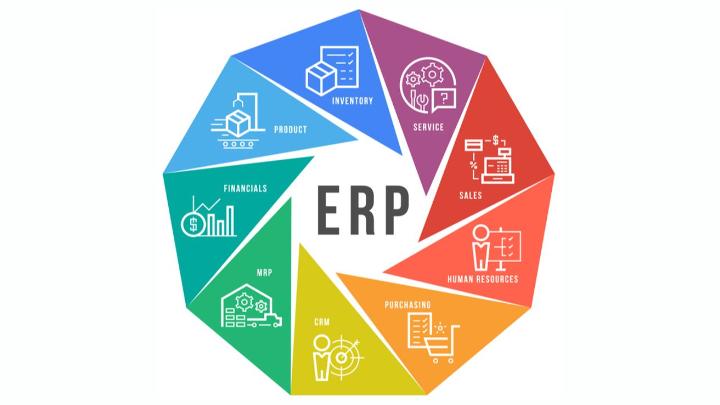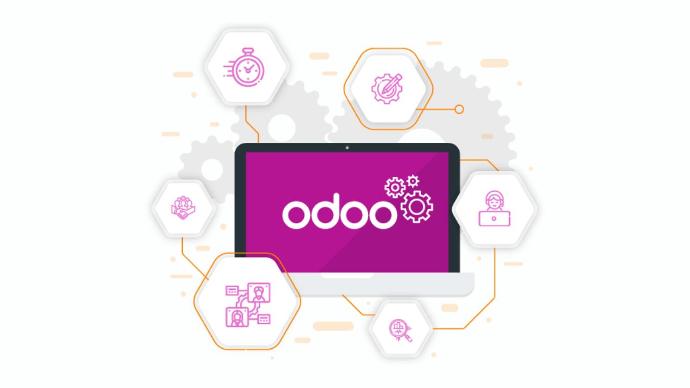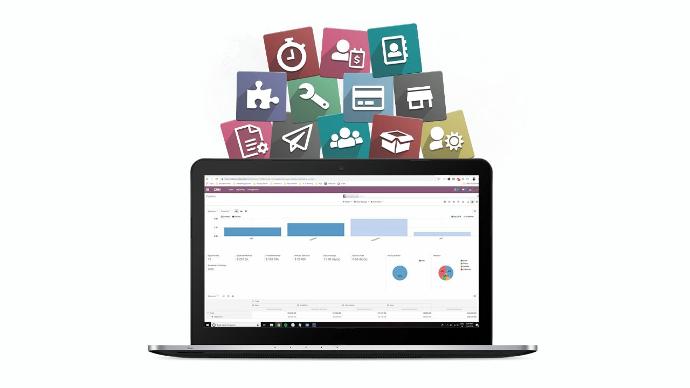Operating an organization seamlessly necessitates cohesive collaboration among its various departments. This entails the execution of numerous procedures by different individuals situated in disparate locations.
To achieve the desired outcomes in business, it is essential to establish synchronization among diverse departments, encompassing intricate business processes, to facilitate their efficient collaboration.
As an entrepreneur, making timely and informed decisions is crucial for accelerating business growth. To ensure seamless business model transitions, it is imperative to implement a streamlined and user-friendly ERP software solution.
By choosing an ERP system that is efficient across all aspects of your business, you can optimize operations, enhance productivity, and drive profitability.
What is an ERP System?
Enterprise Resource Planning (ERP), often referred to as ERP software, encompasses the systems and solutions employed within our organization to oversee and control a range of essential operations, including manufacturing, accounting, sales, procurement, project management, and more.
An ERP system facilitates seamless access and integration of multiple business activities by utilizing a unified data structure, thus serving as a centralized database.
At the core of an ERP system lies the fundamental principle of central data aggregation, which is disseminated across various functions and departments. This allows for streamlined data management, enhanced collaboration, and improved decision-making processes throughout the enterprise.
By leveraging an ERP solution, businesses can optimize their workflows, automate processes, minimize errors, and gain comprehensive insights into their operations.
Furthermore, a centralized ERP database enables efficient data sharing and real-time visibility, fostering effective communication and coordination among different teams and departments.

ERP software acts as a cohesive foundation for organizations, enabling them to efficiently manage their diverse activities while promoting collaboration and harnessing the power of data-driven decision-making.
But relying solely on ERP software utilizing a specific ERP Software like Odoo, businesses may encounter several challenges.
Such software may lack the necessary functionality and specialized modules required for efficient operations within your industry. As a result, businesses may need to invest in additional software or integrations, leading to higher costs and complexities.
Integration issues may arise, causing data inconsistencies and hindered communication between departments. The scalability of generic ERP software may be limited, restricting business growth.
Additionally, compliance requirements and industry-specific features may not be adequately addressed. Without the support, updates, and community insights offered by a dedicated ERP solution like Odoo, businesses may face difficulties in receiving timely assistance and accessing the latest features.
It is crucial to carefully evaluate your business needs and consider a specialized ERP solution that can provide tailored features and industry-specific capabilities to address your unique requirements.
Don't Just Read About Success,
Take the Next Step
Let's Schedule a Consultation Meeting
There Comes Odoo Into the Frame

Odoo is a cloud-based ERP software that provides a comprehensive range of business applications aimed at effectively managing and streamlining diverse operational processes.
Renowned for its high level of configurability, adaptability, and scalability, Odoo proves to be an excellent choice for organizations of all sizes and industries.
With its cloud-based infrastructure, businesses can leverage the flexibility and accessibility offered by the software, enabling seamless collaboration and remote access to critical information.
Odoo offers a vast array of modules and applications to cater to various business needs. These include modules for accounting, inventory management, sales and CRM, manufacturing, project management, human resources, e-commerce, and more.
The modular nature of Odoo allows businesses to choose and integrate the specific functionalities they require, ensuring a tailored ERP solution that aligns with their unique requirements.
One of the key advantages of Odoo is its extensive customization capabilities. Businesses can easily configure and personalize the software to adapt to their specific workflows, processes, and branding.
This flexibility enables organizations to optimize their operations and align the ERP system with their existing practices, rather than having to conform to rigid software limitations.
Furthermore, Odoo fosters collaboration and communication within an organization by providing a centralized platform. It enables teams to share information, collaborate on projects, and streamline communication, leading to improved productivity and efficient decision-making.
Odoo ERP software empowers businesses to automate and optimize their workflows, drive operational efficiency, and enhance overall productivity.
Its robust and user-friendly nature ensures that businesses can effectively manage their operations, minimize costs, and achieve improved profitability.
Odoo's cloud-based ERP software provides a comprehensive suite of applications, extensive customization options, seamless collaboration, and the flexibility to adapt to changing business needs. By leveraging Odoo, businesses can streamline their operations, drive efficiency, and achieve sustainable growth in today's competitive landscape.
Still, Looking for A Reason to Choose Odoo ERP?

1. Cost-effective:
Odoo ERP, being an open-source solution, provides extensive customization capabilities. This ERP software allows businesses to tailor the system according to their specific needs and requirements.
By studying the company's unique requirements, Odoo can be customized to create a personalized and optimized software solution. Users have the flexibility to choose the features and functionalities that best align with their business processes, resulting in a customized and tailored experience while using the software.
Additionally, Odoo implementation companies provide dedicated support for customization, ensuring that businesses receive the necessary assistance and expertise to shape the ERP system precisely to their liking.
This customization facility empowers businesses to have full control over their ERP software, enabling them to optimize their operations and achieve greater efficiency in their day-to-day activities.
2. Integration:
Odoo offers a diverse range of modules that can be seamlessly integrated to enhance the business experience.
The integration allows users to effectively manage multiple functions such as sales, purchasing, CRM, and HRMS, among others. By integrating these modules, businesses can achieve better coordination between different departments and synchronize their overall operations.
This integration capability fosters improved collaboration, streamlines processes, and enables a more holistic approach to organizational workflow.
Businesses can leverage the power of Odoo's integrated modules to optimize their operations, increase efficiency, and drive overall productivity.
3. Customization:
As a cloud-based solution, Odoo ERP provides extensive customization capabilities, allowing businesses to tailor the software to their specific needs. By studying the company's requirements, Odoo can be customized to create a personalized and optimized software solution.
Users have the flexibility to select the integrated features that provide a personalized experience while using the software. Additionally, Odoo implementation companies offer dedicated customization support to customers, ensuring that businesses receive the necessary assistance and expertise to shape the ERP system precisely according to their requirements.
This customization facility empowers businesses to have full control over their ERP software, enabling them to optimize their operations and achieve maximum efficiency in their business processes.

4. Cloud ERP:
Odoo is a cloud-based ERP solution that operates on the cloud, providing businesses with a comprehensive suite of services.
By leveraging the cloud infrastructure, businesses can eliminate the need for separate data management systems and on-premises servers. With Odoo, data storage becomes more secure, and the system includes backup support to ensure data integrity and resilience.
Furthermore, using Odoo allows businesses to streamline their operations, reducing the need for extensive maintenance staff as the system is managed and maintained by the cloud service provider.
This cloud-based approach simplifies IT infrastructure, enhances data security, and enables businesses to focus on their core operations with greater efficiency.
5. Wide Range of Features:
Odoo ERP offers a customizable and extensive range of modules, making it a popular choice for businesses seeking a comprehensive ERP solution.
1. Customer Relationship Management (CRM)
2. Sales
3. Accounting
4. Inventory Management
5. Quality Control
6. Manufacturing
7. Distribution
8. Retail
9. Project Management
10. Human Resources Management (HRM)
11. Helpdesk
6. Open-source:
Odoo is open-source software, making it an advantageous option for businesses as there are no licensing fees involved. It offers two editions: the Community edition and the Enterprise edition.
The Community edition is provided at no cost, while the Enterprise edition, a more advanced version, remains cost-effective due to its open-source nature.
The utilization of open-source software facilitates customization and seamless integration with other applications, leading to smoother operations. The collaborative efforts of a vast community of developers ensure effective bug fixing and error management, resulting in continuous improvement of the product.
7. User-friendly:
Odoo provides an intuitive and user-friendly interface supported by systematic assistance. Utilizing Odoo does not require extensive technical expertise, as it can be easily used by any employee within a business.
Enables employees to leverage its capabilities for enhancing various aspects of the business, without the need for specialized technical skills.

8. Easy Implementation:
The implementation of Odoo applications is significantly more straightforward compared to other ERP software available in the market.
Odoo consists of modules that allow you to implement various processes in a modular fashion, ensuring that the overall system remains undisturbed. Ability to seamlessly integrate different applications within the software, promoting efficient and cohesive workflows.
As a certified Odoo Partner, Teknovative Solutions ensures that our clients receive customized solutions that precisely align with their unique business requirements.
With the robust functionality and scalability of Odoo, coupled with the expertise of our experienced professionals, we guarantee a seamless and stress-free migration to the Odoo ERP solution.
We invite you to reach out to us and explore how we can collaborate to plan and create a tailored solution that addresses all your business needs effectively.
As a certified Odoo Partner, Teknovative Solutions ensures that our clients receive customized solutions that precisely align with their unique business requirements.
With the robust functionality and scalability of Odoo, coupled with the expertise of our experienced professionals, we guarantee a seamless and stress-free migration to the Odoo ERP solution.
We invite you to reach out to us and explore how we can collaborate to plan and create a tailored solution that addresses all your business needs effectively.
Don't Wait for the Right Time,
Let's Talk & Implement it
Let's Schedule a Consultation Meeting